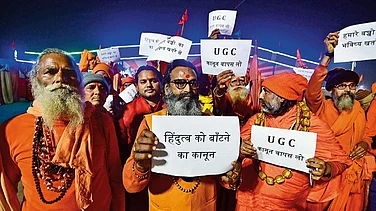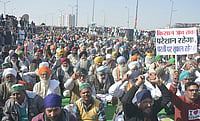The Railway Recruitment Board (RRB) released a notification for 35,281 vacancies in 2019. The posts ranged from that of junior clerk and train assistant to station master. Around 1.26 crore candidates applied for these posts.
Examinations were to be held in March 2020, but they were postponed to December 2020–July 2021 due to the ravaging pandemic. However, protests erupted as soon as the results were out on January 14. The reason sums up the crisis that India’s educated youth finds themselves in.
Around 7.5 lakh candidates were shortlisted for the second round of tests. Upon scrutiny, however, it was found that 7.5 lakh ‘applications’ were shortlisted, and the number of actual candidates was only around 3.84 lakh. Actually, several candidates had applied for multiple posts and were, therefore, shortlisted multiple times.
This led aspirants to believe that they were being robbed of fair play.
Among those who were shortlisted multiple times were candidates with higher educational qualifications. They had applied for posts matching their qualifications as well as posts that were below their qualifications. Of the 35,281 posts, 24,281 were for graduates and 11,000 were for Class XII pass candidates.
This meant that lesser educated candidates were likely to be disadvantaged as candidates with higher qualifications would likely do better than them in the second round of tests and get jobs they had applied for. This anger over losing their chance at jobs, coupled with the three-year delay in the recruitment process, spilled over on to the streets and Uttar Pradesh and Bihar were rocked by fierce public protests. Marches were taken out, trains were stopped and coaches set on fire.
Young aspirants often spend years preparing for government jobs. Many of them cannot afford to pursue higher education, so they prepare for lower-level jobs for the financial security that comes with it. But when scandals like these happen, they feel cheated. “These are Group D jobs. We will be tightening nuts and bolts. For that too, you are taking exams in two parts, CBT-1 and CBT-2. The second one is a computer-based test. Isn’t it ironic? In India, one exam takes over two years to complete—from notification to joining—and that too, under ideal conditions, which usually don’t exist. Isn’t that a waste of our time?” says Bholu Yadav, a young aspirant.
Prashant Yadav, 25, has done an MA and LLB and yet he is open to any government job, not just the one befitting his educational qualifications. He appears for every government recruitment drive that is round the corner. Speaking to Outlook, Yadav says, “Everyone can’t crack the civil services exams, which keep on getting delayed, so I thought I should do something instead of sitting idle. Now, I simply want a government job.”
The privatisation of government services and the culture of contractual jobs instead of full-time employment further worsen the situation for aspirants. Though the Union government has stated the Indian Railways will never be privatised, there are fears nonetheless. An estimate by an employee body said that as many as 3.5 lakh jobs could be at risk if the Railways were ever privatised. This reflects in the anxiety of aspirants.
“The government is selling and privatising everything, including the Railways. Job opportunities are ending. We want government jobs, because there is no security in private jobs. Unlike the government, the private sector follows the hire-and-fire policy,” said one of the agitating Railways job aspirants to the media during the protests earlier this year.
However, such policies are also creeping into spheres other than the Railways, particularly since the beginning of the pandemic. Many healthcare workers were recruited during the early phase of the pandemic. Over 2,000 such workers were terminated in March in Haryana. Similarly, in Delhi, hundreds of staffers were laid off at the Ram Manohar Lohia Hospital.
This means young aspirants rush to whatever government vacancies they see floating around. Last month, around 2.25 lakh candidates applied for 91 vacancies for peon in Chhattisgarh. Thousands of them were graduates, some PhDs.
(This appeared in the print edition as "Fuelling Fears")
(This appeared in the print edition as "Fuelling Fears")


























